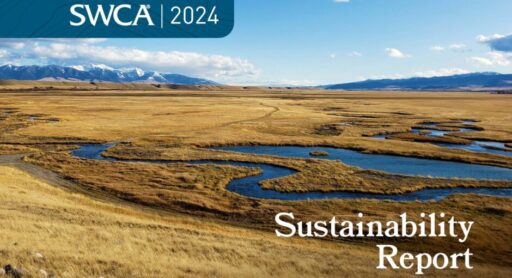2025
Comparably’s Best Company Outlook
* Providing engineering services in these locations through SWCA Environmental Consulting & Engineering, Inc., an affiliate of SWCA.

From the experts we hire, to the clients we partner with, our greatest opportunity for success lies in our ability to bring the best team together for every project.
That’s why:

At SWCA, sustainability means balancing humanity’s social, economic, and environmental needs to provide a healthy planet for future generations.

SWCA employs smart, talented, problem-solvers dedicated to our purpose of preserving natural and cultural resources for tomorrow while enabling projects that benefit people today.

At SWCA, you’re not just an employee. You’re an owner. Everyone you work with has a stake in your success, so your hard work pays off – for the clients, for the company, and for your retirement goals.
Reasonably Certain Confusion: An Update on Recent Endangered Species Act Rulemakings, Policies, and Court Opinions
Enter your email address to immediately gain full access to this content. You can also opt-in to SWCA’ quarterly email newsletter, The Wire, for more news and insights.
Amanda Glen is SWCA’s natural resources technical director for biological services and provides strategic guidance on permitting and compliance for matters involving protected wildlife, plants, and habitats. Currently managing a national practice, she has more than 25 years of consulting experience with an emphasis on the Endangered Species Act (ESA) and how compliance with the ESA influences other regulatory programs. Her wealth of experience pertaining to endangered species issues includes research, permitting, consultations, status reviews, and conservation planning. Her experience includes negotiating compliance solutions for critically imperiled species facing potential determinations of jeopardy or adverse modification of designated critical habitats. She has led efforts to delist species no longer requiring the protections of the ESA when supported by sound science, and has been involved in voluntary conservation planning to help preclude the need to list species. Amanda frequently presents at regional and national conferences on matters related to the ESA, including new listings, regulatory and policy changes, and trends in compliance strategies.

Stephanie is a Senior Ecologist at SWCA, specializing in wildfire collaboratives and providing technical support to communities pre-, during, and post-wildfires across the western U.S.



Decisions under the Endangered Species Act are made using science, but rarely does science provide clear answers. Where there is uncertainty, professional judgment can play an outsized role in decision-making. For example, the application of the “reasonably certain to occur standard” or the “precautionary principle” are professional judgments that can be the determinative factor in listing or critical habitat determinations or effects analyses and take estimates.
Absent Congressional direction, the U.S. Fish and Wildlife Service and National Marine Fisheries Service have developed and applied varied regulations, policies, and informal practices together with the broad mandate to use the best available scientific information to make decisions. Recent agency rulemakings, policy announcements, and court opinions provide insights into the direction the Services are headed in employing this suite of decision-making tools and the extent to which the judiciary may constrain the Services.
Paul Weiland and Amanda Glen explore recent developments expected to influence decisions about listings, permitting, and consultation. Paul will review the D.C. District Court’s July opinion in Maine Lobstermen’s Association v National Marine Fisheries Service. Amanda will review U.S. Fish and Wildlife Service rulemakings and policy on interagency cooperation and mitigation. Stephanie Graham will moderate the discussion and questions from the audience.
Paul Weiland | Assistant Managing Partner, Nossaman LLP
Amanda Glen | Senior Technical Director, SWCA Environmental Consultants
Stephanie Graham | Senior Wildlife Biologist, SWCA Environmental Consultants